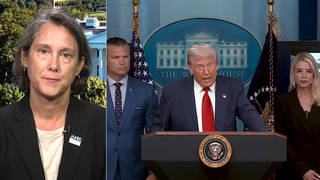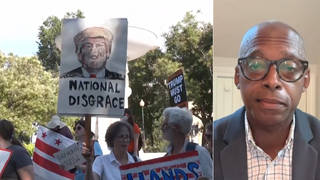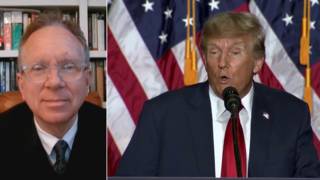
Guests
- Rocky Andersonformer mayor of Salt Lake City, Utah. He’s a former Democrat who once endorsed Mitt Romney for governor of Massachusetts. In 2012, he ran for president on the Justice Party ticket. He’s also an attorney and the founder of High Road for Human Rights.
Seven Republican presidential candidates faced off Thursday in their final debate before the Iowa caucuses. The front-runner, at least according to the polls, was missing. Donald Trump hosted his own event three miles away, saying he was boycotting the debate after Fox News refused to remove anchor Megyn Kelly as one of its moderators. We feature excerpts from the debate about Planned Parenthood, proposals to “carpet bomb” areas of Syria in the effort to fight the self-proclaimed Islamic State, and hate crimes against Muslims; and get reaction from a man who ran for president as a third-party candidate. Rocky Anderson, the former mayor of Salt Lake City, is a former Democrat who once endorsed Mitt Romney for governor of Massachusetts. In 2012, he ran for president on the Justice Party ticket. He’s also an attorney and the founder of High Road for Human Rights.
Transcript
AMY GOODMAN: Last night was the final Republican debate before the Iowa caucuses. Seven Republican presidential candidates faced off in a debate in Des Moines, Iowa. One was missing—the front-runner, at least according to the polls. That’s Donald Trump, who hosted his own event three miles away, saying he was boycotting the debate after Fox News refused to remove anchor Megyn Kelly as one of its moderators. With Trump gone, the seven remaining candidates went at it. This is Texas Senator Cruz and Florida Senator Marco Rubio.
SEN. TED CRUZ: If I am elected president, keep an eye on the tarmac, because I’ll be back, because Iowa in 2017 will not be flyover country, it will be fly-to country. Now, secondly, let me say, I’m a maniac, and everyone on this stage is stupid, fat and ugly. And, Ben, you’re a terrible surgeon. Now that we’ve gotten the Donald Trump portion out of the way…
BRET BAIER: Now, let’s talk about electability, Senator. Time magazine once called you “the Republican savior.”
SEN. MARCO RUBIO: Well, let me be clear about one thing: There’s only one savior, and it’s not me. It’s Jesus Christ, who came down to Earth and died for our sins. And so—and I’ve always made that clear about that cover story.
As far as the polls are concerned, Iowa, on Monday night you’re going to go to a caucus site, and you’ll be the first Americans that vote in this election. You will be the first Americans that get to answer the fundamental question: What comes next for this country after seven disastrous years of Barack Obama? And let me tell you what the answer better not be: It better not be Bernie Sanders. Bernie Sanders is a socialist. I think Bernie Sanders is a good candidate for president—of Sweden.
AMY GOODMAN: That was Florida Senator Marco Rubio; before that, Senator Ted Cruz. Also at Thursday night’s Republican debate, New Jersey Governor Chris Christie said he would get rid of funding for Planned Parenthood. But this clip begins with the debate moderator, Bret Baier.
BRET BAIER: Governor Christie, you talk a lot about entitlement reform, and you say that that’s where the federal government can get savings needed to balance the budget. But can you name even one thing that the federal government does now that it should not do at all?
GOV. CHRIS CHRISTIE: Yeah. You want one?
BRET BAIER: I want one.
GOV. CHRIS CHRISTIE: Yeah. How about one that I’ve done in New Jersey for the last six years? And that’s get rid of Planned Parenthood funding from the United States of America.
BRET BAIER: Anything bigger than that?
GOV. CHRIS CHRISTIE: Bigger than that? Let me tell you something, when you see thousands upon thousands upon thousands of children being murdered in the womb, I can’t think of anything bigger than that.
AMY GOODMAN: That’s New Jersey Governor Chris Christie. But, you know, he was quoted in 1994 in an article, saying, quote, “I support Planned Parenthood privately with my personal contribution.” Earlier this month, Christie said that was a misquote, although the person he accused of misquoting him now works as his press spokesperson.
Well, to talk more about the 2016 presidential race, we’re joined by a man who ran for president in 2012, not as a Democrat or as a Republican, but a third-party candidate—Rocky Anderson, former mayor of Salt Lake City. He is a former Democrat who once endorsed Mitt Romney for governor of Massachusetts. In 2012, he ran for president on the Justice Party ticket. He’s also an attorney and the founder of High Road for Human Rights.
Rocky Anderson, welcome back to Democracy Now!
ROCKY ANDERSON: Great to be back.
AMY GOODMAN: It’s great to have you with us.
ROCKY ANDERSON: Thank you, Amy.
AMY GOODMAN: Well, let’s start with that last comment, after we’re—after all, we are in Utah, in Romney land. Chris Christie saying how he would cut the budget?
ROCKY ANDERSON: Yeah. He’s given this great open question: What are you going to do for a smaller government, balance the budget? And he picks a minuscule element of our budget like cutting Planned Parenthood. And in Utah, our governor cut Planned Parenthood funding because of this fraudulent story about this video that was taken. And you know what suffered? It’s been sex education and STD treatment and education. And there’s nobody else to fill the slot, and state health department officials here have made that very clear.
AMY GOODMAN: Now, interestingly, wasn’t it Romney in—in the same year, in 1994?
ROCKY ANDERSON: It was 1994, yeah. Romney admitted that he also had contributed to Planned Parenthood privately. So I find it just unbelievable that these people, who—you wonder who they really were. And you mentioned that I supported Mitt Romney when he ran for governor. That was a different Mitt Romney. That was the moderate-leaning liberal man who won the governorship in Massachusetts. But the day he decided to run for president, he switched on everything, whether it was equal rights for gays and lesbians, whether it was support for Roe v. Wade. So, that’s what these people do. They’re political opportunists. They find where the polls are at the time. And we saw a perfect example. When Chris Christie could have given a serious response to how are we going to balance our budget and what kind of entitlement reform are you talking about, what does he do? He picks that little minuscule piece of the federal budget, Planned Parenthood funding.
AMY GOODMAN: Marco Rubio, his comment about Jesus Christ?
ROCKY ANDERSON: That was unbelievable. Here he’s asked about what’s happened to him. Time magazine said he was going to be the savior of the Republican Party. And what does he do? Panders to the religious right, in a—the kind of divisive comment that’s creating so much divisions across the board politically in this country. He focuses on the word “savior” and says so righteously, “Well, there’s only one savior: he who died for our sins.” I think that’s really disgusting political dialogue, when we’ve got so many problems to be dealing with. But there were some good things last night, but mostly not very good and some really ugly things that were said.
AMY GOODMAN: I want to turn to, well, the polls saying that Ted Cruz, the senator from Texas, is neck and neck right now with Donald Trump. Ted Cruz, who defended his earlier statement, said he would, quote, “carpet bomb” areas of Syria in an effort to fight the self-proclaimed Islamic State.
SEN. TED CRUZ: Well, Chris, I will apologize to nobody for the vigorousness with which I will fight terrorism, go after ISIS, hunt them down wherever they are, and utterly and completely destroy ISIS. You know, you claim it is tough talk to discuss carpet bombing. It is not tough talk. It is a different fundamental military strategy than what we’ve seen from Barack Obama. Barack Obama right now, number one, over seven years, has dramatically degraded our military. You know, just two weeks ago was the 25th anniversary of the first Persian Gulf War. When that war began, we had 8,000 planes. Today we have about 4,000. When that war began, we had 529 ships. Today we have 272. You want to know what carpet bombing is? It’s what we did in the first Persian Gulf War—1,100 air attacks a day, saturation bombing that utterly destroyed the enemy. Right now, Barack Obama is launching between 15 and 30 air attacks a day. He’s not arming the Kurds. We need to define the enemy. We need to rebuild the military to defeat the enemy. And we need to be focused and take—lift the rules of engagement, so we’re not sending our fighting men and women into combat with their arms tied behind their back.
AMY GOODMAN: That’s Texas Senator Ted Cruz. But at the same time, you have an unnamed Pentagon official telling The New York Times that Obama is considering raising the stakes in both Iraq and Syria. Your comments?
ROCKY ANDERSON: Well, first of all, the idea of carpet bombing, every military leader in this country that’s addressed that idea said he doesn’t know what he’s talking about—and I’m paraphrasing. But these folks aren’t out lined up in the desert so we can just go in and wipe them out through carpet bombing. They’re in villages and towns with innocent civilians. And then, what’s really frightening is he talks about getting rid of the rules of engagement. Is he talking about getting rid of the Geneva Convention? And I’m afraid Jeb Bush bordered on that, as well, talking about getting the lawyers off the backs of the military. This is very frightening saber rattling of the worst sort.
AMY GOODMAN: Let’s turn to Ohio Governor John Kasich answering moderator Chris Wallace’s question about Kasich’s decision to expand Medicaid in Ohio.
GOV. JOHN KASICH: Well, you know, Chris, here’s what happened with Medicaid in my state. We took the growth of Medicaid from over 10 percent in my second budget to two-and-a-half percent without cutting off one person or cutting one benefit, because we—we innovated the government. And now mom and dad can stay in their own home rather than being forced into a nursing home. And then we decided we could bring $14 billion of our money. I mean, Washington doesn’t have any money. It was our money. We brought them back to tend to the mentally ill, because I don’t think they ought to live in prison or live under a bridge, to treat the drug-addicted so they’re not in a in-and-out-of-the-door policy out the prisons, and to help the working poor so they don’t live in emergency rooms. How has it worked? Well, we have treated the drug-addicted in our prisons, and we released them into the community, and our recidivism rate is less than 20 percent. That’s basically bordering on a miracle, because of our great prison director. The mentally ill? They’ve been stepped on for too long in this society, and we are beginning to treat them.
AMY GOODMAN: That’s Ohio Governor John Kasich. Salt Lake City former Mayor Rocky Anderson?
ROCKY ANDERSON: That was absolutely the high point of the debate, I think, for a Republican candidate to try to turn away from what we’ve seen in this country, in terms of the treatment of the mentally ill, since the Reagan years, to talk, finally, about our nation committing to treatment of the mentally ill and the drug-addicted, rather than making our jails and prisons the places of first resort for their—whatever treatment they do get, and mostly their housing.
AMY GOODMAN: During Thursday night’s debate, the moderators took questions from YouTube viewers, including Nabela Noor, who asked Jeb Bush about hate crimes against Muslims.
NABELA NOOR: In 2015, the number of hate crimes against Muslims in the U.S. has tripled. And on social media, where I spend a lot of time, I’ve seen many attacks directed towards fellow Muslims. This culture of hatred is only driving ISIS to radicalize, recruit and incite violence. As president, what would you do to address this toxic climate and promote increased tolerance in the United States?
JEB BUSH: Well, first of all, I think it’s important that when we’re running for the highest office in the of land, that we recognize that we’re living in dangerous times. And we have to be serious about it, that our words have consequences. Donald Trump, for example, I’m glad he—I mentioned his name again, just if anybody was missing him. Mr. Trump believed that in reaction to people’s fears, that we should ban all Muslims. Well, that creates an environment that’s toxic in our own country. …
We need to focus our energies there, not these broad, blanket kind of statements that will make it harder for us to deal with ISIS. We need to deal with ISIS in the caliphate. We need a strategy to destroy ISIS there. You can’t do that without the cooperation of the Muslim world, because they’re as threatened as we are. And so, I think it’s important for us to be careful about the language we use, which is why I’ve been critical of Donald Trump disparaging women, disparaging Hispanics. That’s not a sign of strength. Making fun of disabled people? We’re never going to win elections if we don’t have a more broader, unifying message.
AMY GOODMAN: And that’s former Florida Governor Jeb Bush, who many thought would be the front-runner, until he was Trumped and Cruzed. Yes, Salt Lake City former Mayor Rocky Anderson, your thoughts on what he said?
ROCKY ANDERSON: Well, I think it was so absolutely important to encapsulate it the way that Jeb Bush did, that what Trump is saying has real consequences. And there is this atmosphere of hate that’s generated when Trump talks about excluding Muslims from this nation and his demeaning comments about women, about people with disabilities, about Hispanics. What’s really the most shocking about this race is that anybody is taking him seriously at this point and supporting such a bigoted misogynist as Donald Trump.
AMY GOODMAN: We are in Utah right now. This is where Mitt Romney, you know, came from—
ROCKY ANDERSON: He lives here now.
AMY GOODMAN: —where his family came from, lives here. He made a deal with George Bush—with Jeb Bush, right? Meeting that was held? It looked like Romney was going to run, but then it was Jeb Bush.
ROCKY ANDERSON: Yeah, I mean, the trajectory was, it looked like Mitt Romney was going to jump into this race. And believe me, if it were the old, rational, moderate Mitt Romney, he’d be very welcomed in this race by a lot of us.
AMY GOODMAN: You mean the Planned Parenthood supporting Mitt Romney?
ROCKY ANDERSON: The Planned Parenthood supporting Mitt Romney—
AMY GOODMAN: Isn’t actually Obamacare—
ROCKY ANDERSON: —who won the governorship of Massachusetts.
AMY GOODMAN: And Obamacare is based on Romneycare in Massachusetts—
ROCKY ANDERSON: It is, indeed.
AMY GOODMAN: —which actually does provide funding for abortion.
ROCKY ANDERSON: Which was a product of the Heritage Foundation. And yeah, we all know where it came from—basically written by the insurance companies. But I think it was so important to finally—whether Trump was there or not, to address the real consequences of this kind of hateful, bigoted dialogue in this country.













Media Options